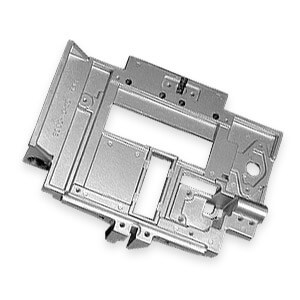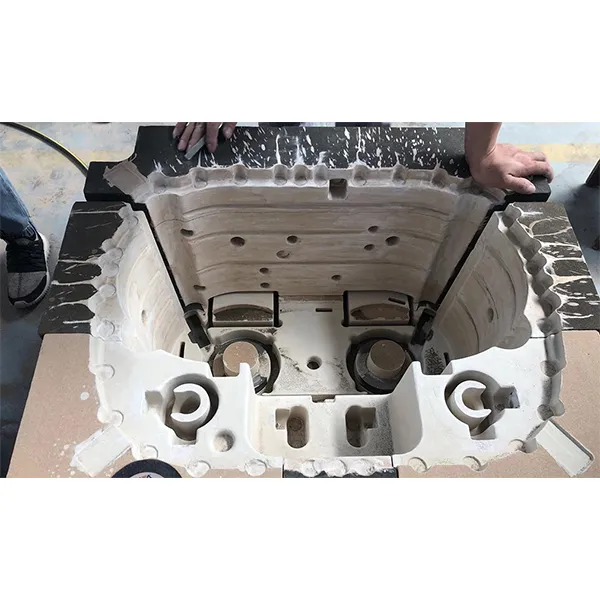The Future of Light Weight Aluminum Foundries: Innovations and fads Shaping the Industry
The light weight aluminum foundry sector is undergoing substantial makeover. Key fads highlight the significance of sustainability and efficiency. Developments in smart production and automation are ending up being widespread. Shops are significantly concentrated on utilizing recycled materials. This shift increases concerns about future techniques and technologies. How will these adjustments impact manufacturing methods and market dynamics? The solutions may redefine the sector landscape in unexpected methods.
Improvements in Smart Manufacturing Technologies
As the aluminum shop industry progresses, innovations in smart manufacturing technologies are coming to be increasingly important for enhancing performance and effectiveness. The assimilation of automation, synthetic knowledge, and the Web of Points (IoT) is changing traditional foundry procedures. These modern technologies enable real-time monitoring of processes, enabling instant adjustments that maximize result and reduce waste.
Maker understanding formulas examine production data to identify patterns and predict maintenance needs, minimizing downtime. Robotics are progressively utilized for repeated jobs, releasing knowledgeable employees to focus on more complex challenges. In addition, digital twins-- online versions of physical procedures-- assist in simulations that can enhance style and functional methods.
The adoption of these smart manufacturing innovations is driving affordable benefits in the aluminum shop sector. By simplifying process and boosting decision-making capacities, shops can satisfy expanding market needs while keeping high-grade requirements. The future of aluminum foundries is undoubtedly linked to these technological technologies.
Accepting Eco-Friendly Products and Processes
The aluminum foundry sector is progressively concentrating on environmentally friendly products and processes to improve sustainability. This change consists of the adoption of sustainable product sourcing, energy-efficient production strategies, and efficient recycling and waste management approaches. By integrating these techniques, foundries aim to lower their environmental influence while preserving competition out there.
Sustainable Material Sourcing
Just how can aluminum shops boost their sustainability efforts? Lasting material sourcing has become a necessary strategy in achieving this objective. By focusing on recycled aluminum, factories can greatly minimize their ecological impact, as recycled materials need much less energy and less sources contrasted to main aluminum manufacturing. In enhancement, sourcing materials from accredited vendors that adhere to environmentally friendly techniques promotes responsible mining and lessens eco-friendly influence. Foundries are also exploring alternate materials, such as biopolymers and environmentally friendly layers, to enhance typical light weight aluminum procedures. Working together with stakeholders, consisting of vendors and environmental organizations, fosters innovation in sourcing approaches. Eventually, accepting lasting product sourcing not only lines up with worldwide sustainability goals however likewise positions light weight aluminum factories as leaders in environmentally responsible production.
Energy-Efficient Production Methods
Light weight aluminum shops are increasingly adopting energy-efficient manufacturing techniques to complement their lasting product sourcing campaigns. These approaches concentrate on lessening energy consumption throughout the production process. Advanced technologies, such as induction melting and optimized casting procedures, are being carried out to minimize the general carbon footprint. Additionally, automation and smart production systems boost operational efficiency, allowing for far better power administration. Factories are likewise exploring the assimilation of renewable resource resources, such as solar and wind, to power their procedures. By prioritizing power effectiveness, light weight aluminum shops not only lower manufacturing prices but likewise align themselves with international sustainability goals, ensuring an extra environmentally liable method to light weight aluminum manufacturing while fulfilling the increasing need for green techniques in the market.
Reusing and Waste Management
Accepting eco-friendly materials and processes, light weight aluminum shops are focusing on recycling and waste monitoring methods to improve sustainability in their operations. By incorporating closed-loop systems, these facilities are lessening waste and optimizing source effectiveness. Scrap aluminum, an easily offered product, is being recycled on-site, significantly reducing the requirement for virgin products and decreasing energy usage. Technologies in sorting and refining technologies additionally promote the recycling of aluminum, guaranteeing that also infected products can be repurposed efficiently. In addition, shops are adopting sustainable methods such as minimizing contaminated materials and advertising using biodegradable materials for packaging. This commitment to recycling not just lowers ecological influence however likewise boosts the financial practicality of light weight aluminum shops in an affordable market.
The Function of Automation and Robotics
Automation and robotics are increasingly changing the aluminum foundry market, considerably enhancing production performance. By integrating innovative modern technologies, shops can minimize labor costs while all at once improving safety and security criteria for their workforce. This shift not just simplifies procedures yet additionally places the sector for sustainable growth in a competitive market.
Enhanced Manufacturing Performance
Revolutionizing manufacturing procedures, the combination of sophisticated robotics and automation innovations has come to be a foundation for light weight aluminum foundries looking for boosted effectiveness. These developments streamline operations, decrease cycle times, and boost product quality by decreasing human mistake. Automated systems can monitor manufacturing lines in real-time, enabling instant adjustments that maximize output. Furthermore, robotics help with the handling of harmful materials, making certain more secure functioning environments while boosting throughput. Predictive upkeep technologies additionally add to performance by anticipating tools failures, consequently decreasing downtime. Therefore, aluminum factories can accomplish better consistency in their items while responding a lot more promptly to market demands. This welcome of automation is setting a brand-new requirement for performance and operational quality within visit homepage the industry.

Decreasing Labor Costs
The shift in the direction of progressed robotics and automation in aluminum foundries not only enhances production effectiveness but also plays a significant function in lowering labor prices. By incorporating automated systems, shops can reduce the reliance on hands-on labor, which usually entails high incomes and training costs. Robotics simplify repetitive tasks such as putting, molding, and finishing, permitting a higher output with fewer personnel. This technical adjustment not just minimizes labor-related expenses however likewise enhances consistency and quality in production. Moreover, automation can operate all the time, taking full advantage of operational hours without the linked prices of overtime or change differentials. Because of this, aluminum foundries can attain considerable savings while keeping affordable pricing in an advancing market landscape.
Improving Safety Criteria
While traditional light weight aluminum foundry procedures commonly expose employees to dangerous environments, the integration of robotics and automation substantially improves safety and security requirements within the industry. Automated systems can execute high-risk jobs, such as molten metal handling and hefty lifting, reducing human exposure to harmful problems. Additionally, robotics can run in toxic environments and severe temperatures, successfully reducing the danger of injury. Advanced monitoring innovations and artificial intelligence assurance real-time safety analyses, permitting instant feedbacks to potential dangers. Moreover, automation improves operations, reducing the probability of crashes caused by human error. Because of this, the fostering of these technologies not only improves safety and security yet also promotes a more reliable and efficient workplace in aluminum shops.
Enhancing Power Performance in Manufacturing
As light weight aluminum factories look for to preserve competitiveness in a progressing market, boosting energy effectiveness in manufacturing has actually become a critical focus. By taking on advanced modern technologies such as high-efficiency melting heating systems and automated temperature controls, foundries can significantly lower energy usage. Executing real-time tracking systems enables accurate tracking of energy usage throughout the manufacturing procedure, enabling fast changes to maximize effectiveness.
Additionally, shifting to different power sources, including eco-friendly alternatives, can additionally decrease the carbon impact. The assimilation of power recuperation systems, which recover waste heat for reuse, is becoming increasingly usual. Educating personnel in energy monitoring methods guarantees that every person associated with the production procedure is conscious of energy usage.
These campaigns not just lower functional expenses but likewise align with international sustainability goals, placing light weight aluminum foundries as accountable players in the market while enhancing their overall competition. - Aluminum Casting Company
Developments in Recycling Light Weight Aluminum
Technologies in recycling light weight aluminum have gained energy alongside efforts to improve power efficiency in manufacturing. The light weight aluminum industry has welcomed sophisticated technologies that enhance the reusing procedure, decreasing energy intake and environmental influence. Techniques such as hydrometallurgy and new sorting modern technologies enhance the extraction of aluminum from scrap, improving return rates and making sure better recycled material.
The growth of closed-loop recycling systems allows shops to reuse light weight aluminum without substantial destruction in quality, making the procedure much more sustainable. Advancements in logistics and collection, including enhanced monitoring systems and automated sorting, have actually likewise played an important function in increasing the efficiency of light weight aluminum recuperation. These improvements not only add to a round economy yet additionally aid minimize the carbon impact linked with aluminum manufacturing. As the demand for lasting techniques expands, these advancements position the aluminum foundry sector as a leader in liable resource management.
Replying To Market Needs and Customer Trends
Versatility has become a keystone for light weight aluminum factories reacting to advancing market needs and customer patterns. As industries significantly focus on sustainability, aluminum foundries are changing in the direction of eco-friendly techniques, including boosted recycling processes and lowered carbon footprints. This change aligns with consumer preferences for environmentally liable products, driving shops to introduce their offerings.
Additionally, the rise of lightweight products in vehicle and aerospace sectors demands these details improvements in aluminum alloys and casting strategies. Foundries are spending in r & d to create high-strength, lightweight components that satisfy stringent performance standards.
Personalization has actually gained traction, with customers looking for tailored remedies. Aluminum factories are leveraging innovative manufacturing technologies, such as 3D printing, to fit details customer requirements effectively. This responsiveness not only satisfies consumer needs yet likewise settings light weight aluminum factories competitively in a dynamic market landscape, ensuring their significance in an ever-changing commercial setting.

Often Asked Inquiries
Just How Do Light Weight Aluminum Foundries Influence Resident Economies?
Aluminum factories considerably influence neighborhood economic situations by developing work, boosting demand for regional providers, and contributing to community development. Their procedures often lead to raised tax obligation earnings, which can money vital civil services and facilities enhancements.
What Are the Safety And Security Laws for Light Weight Aluminum Shop Employees?
Safety policies for aluminum shop workers consist of necessary personal safety devices, proper air flow systems, normal training on harmful materials, and adherence to guidelines set by occupational health and safety administrations to reduce threats and assurance worker safety. - Aluminum Foundry
Just How Does Aluminum Recycling Affect Global Supply Chains?
Light weight aluminum recycling considerably lowers demand for resources, improves resource performance, and supports prices. This change impacts worldwide supply chains by fostering a round economy, promoting sustainability, and guaranteeing an extra resilient sector in fluctuating markets.
What Career Opportunities Exist in the Light Weight Aluminum Foundry Sector?
Different career great site possibilities exist in the light weight aluminum shop market, including functions in design, quality assurance, production administration, and r & d. Proficient labor positions such as mold and mildew manufacturers and equipment operators are additionally sought after.
How Do International Trade Plans Impact Light Weight Aluminum Foundries?
International trade policies considerably influence aluminum foundries by impacting import tolls, supply chain dynamics, and market gain access to. These variables can influence operational expenses, competition, and overall earnings within the international aluminum manufacturing landscape.
By prioritizing recycled aluminum, factories can considerably minimize their ecological impact, as recycled products call for much less power and less sources contrasted to key light weight aluminum manufacturing. Light weight aluminum shops are significantly taking on energy-efficient production strategies to enhance their lasting product sourcing initiatives. Automation and robotics are progressively transforming the aluminum foundry market, significantly improving manufacturing performance. The change in the direction of progressed robotics and automation in light weight aluminum factories not only enhances manufacturing effectiveness but likewise plays a substantial duty in lowering labor prices. As light weight aluminum foundries seek to maintain competitiveness in an evolving market, enhancing power performance in production has arised as a critical emphasis.